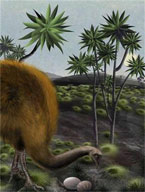Mammoth but fragile
Australian scientists have found that eggs from the giant flightless moa were miniscule and vastly disproportionate to the bird. Eggshells identified by DNA as belonging to the two largest, heaviest moa species, Dinornis robustus and Dinornis novaezealandiae, were thinner than expected, at just 1.41mm (less than the length of a flea) and 1.6mm (about the diameter of a pinhead) thick, respectively. These eggshells seemed especially thin for birds whose females could weigh as much as 25kg. When the researchers tested the outer surfaces of the eggshells, they found them covered in male DNA. Still, even if assumed that the lighter males incubated the eggs, the researchers calculated that given the thinness of the shells, Dinornis eggs would have proven far more susceptible to breakage than any of the 3434 bird species (both living and extinct) measured to date for eggshell strength.














